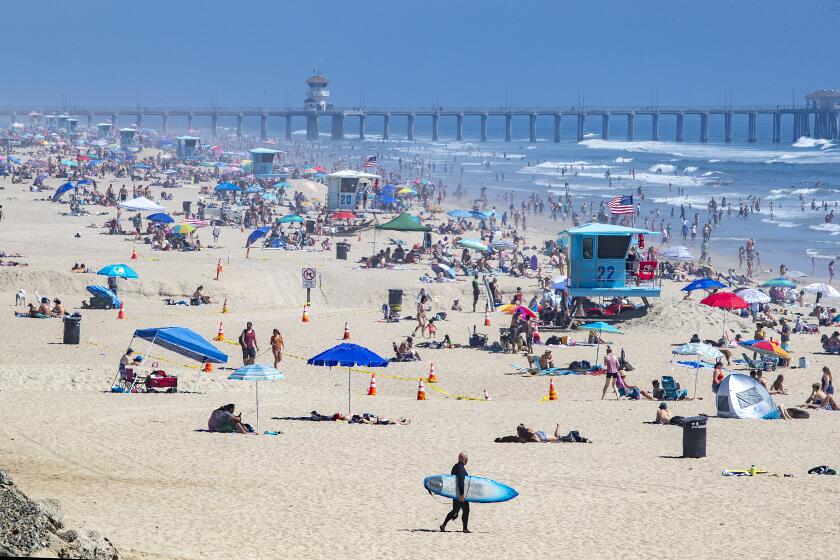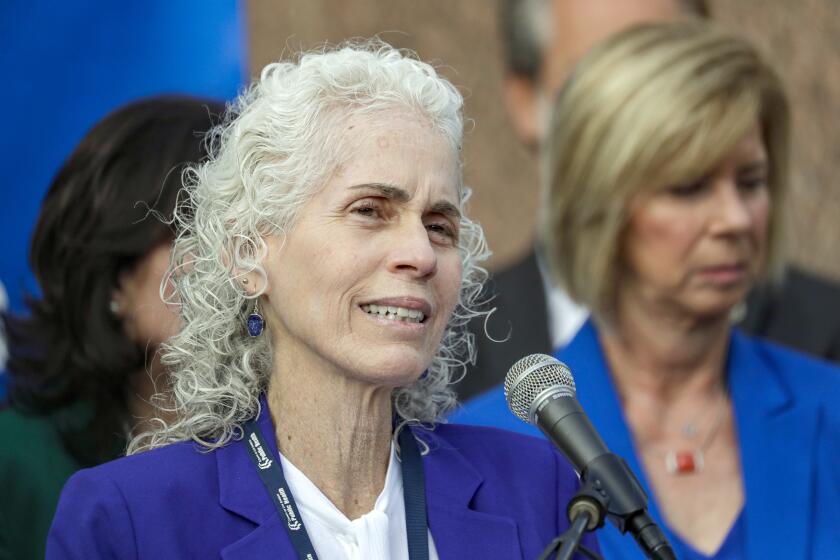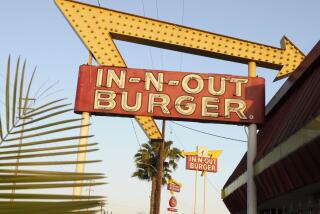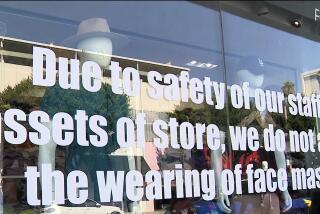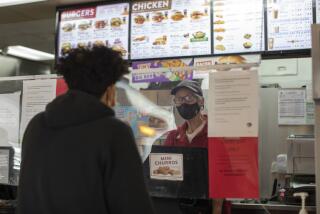Grocery stores seeking masks for ‘essential’ workers confront shortages, federal interference

- Share via
The day after the Centers for Disease Control and Prevention in early April advised everyone to cover their faces in public, the co-owner of a small network of grocery stores in Wisconsin logged into Facebook and began a post: “HELP!”
She had been waiting on a shipment of face masks to protect her employees, but, like many grocers’ orders, it was delayed. Dedicated patrons sprang into action — within a matter of days they had outfitted all 400 workers with homemade face masks.
Six weeks after COVID-19 was declared a pandemic by the World Health Organization, and long after grocery workers were deemed essential, major retailers are only lately beginning to provide them with masks. Walmart and Kroger, the largest supermarket chains in the country, have announced new policies requiring all employees to wear masks. Some independently owned stores are still awaiting shipments or have yet to find a distributor to provide them.
Washington, it seems, has contributed to the delay.
Without a centralized process by the federal government to buy and distribute protective gear, states, cities and hospitals have scrambled to outbid each other — and the feds, too. With prices skyrocketing and supply chains disrupted, some grocery stores have struggled to compete.
According to the National Grocers Assn., in recent weeks five retailers — two of them in California — have seen their deals to buy masks suddenly fall apart when suppliers canceled or postponed the stores’ orders, saying they were required to give priority to the Federal Emergency Management Agency’s requests. The association, which declined to name the retailers, said that has forced some grocers to then have to ask the federal government for help.
On a phone call last week with representatives of grocery and food industry groups, Agriculture Department officials said they would work with FEMA to distribute reusable masks to grocery stores. Store owners are being encouraged to submit requests to the government, though they’ve received no assurance they’ll get anything.
To get a break from weeks of coronavirus restrictions and to take advantage of the sunshine, thousands converge on some California beaches.
In just the last week, the director of emergency management for Miami-Dade County accused the federal agency of commandeering a shipment of 1 million N95 masks, and a Delaware medical equipment supplier said FEMA had taken control of two of his shipments intended for customers in the United States.
As complaints have multiplied, FEMA officials have denied reports that the agency has seized urgently needed medical supplies or rerouted shipments already committed to other buyers. “What we have found in these kind of cases is that it is a miscommunication between the customer and distributor,” a FEMA spokesman wrote.
Grocers, their lobbyists and the United Food and Commercial Workers International Union, which represents 900,000 grocery employees at major chains, have called on the Trump administration in recent weeks to consider grocery employees as among those that should be favored to receive protective gear. While doctors, nurses and law enforcement officers should have first priority, the grocery representatives said, their own workers have been pushed too far down the list of recipients.
The hope is that by recognizing stock clerks and cashiers as “extended first responders” or “emergency personnel,” government officials might be more willing to share their supplies and less inclined to interfere in grocery stores’ orders.
“I talk with my peers at big chains and small and most of us have struggled,” said John Ross, president of the Independent Grocers Alliance, a network of 1,200 stores nationwide. “We weren’t even on the radar screen as people were thinking, ‘Who do I protect first?’”
Another reason for the delay is that the vast networks of distributors and wholesalers that grocers rely on don’t typically carry medical masks. Those are less effective than N95s, which filter 95% of particles, but still are capable of filtering 60% to 80%. Forced to look outside of their usual supply chains, supermarkets and independent grocers found themselves outgunned in a market controlled by overseas sellers and brokers.
While supplies of medical and cloth masks have increased in recent weeks, Ross said, many grocery stores still don’t have enough to protect their employees. “Only now are they tapping into international and domestic sources and starting to stock up for us in order to meet demand,” he said.
Meanwhile, grocery workers are putting in longer hours to stock shelves, fill online orders and spray every surface with disinfectant — often within a few feet of customers who might not be wearing masks. Thousands of grocery workers have tested positive for the coronavirus and, as of April 12, at least 41 had died, according to a report by the Washington Post.
A growing number of states and cities have issued orders restricting how grocery stores operate. They’ve imposed occupancy limits, shut down salad bars and delis, and directed stores to set aside certain hours for older people and other vulnerable customers.
A small number have published guidelines recommending that everyone inside a grocery store — customers and shoppers — wear masks, but few have required it.
Los Angeles County public health officials on Sunday reported 18 additional COVID-19 deaths and 440 new cases of the coronavirus and said that people in lower-income communities are three times more likely to die of COVID-19.
California’s guidance for grocery stores, which the state issued April 15, said only that employers should issue masks to their workers if they’re unable to keep the proper distance from customers. The rules in Los Angeles are more stringent. Mayor Eric Garcetti’s order requires owners of essential businesses, such as grocery stores, pharmacies and restaurants, to provide their workers with cloth face coverings or reimburse them for the cost. Customers can be denied service if they enter a business without their nose and mouth covered.
The possibility that these orders could become more widespread at a time when masks remain so hard to get has some grocers nervous.
The president of the Wisconsin Grocers Assn., Brandon Scholz, said that if the state handed down a mandate similar to those in Maryland or New Jersey, many of Wisconsin’s smaller grocery stores wouldn’t be able to comply.
They have been adapting, he said. Stores have installed plexiglass shields to protect cashiers, enforced social distancing measures at checkout lines and provided hand-sanitizing stations. Owners and managers who were initially hesitant to order masks have now become concerned that they don’t have an answer to satisfy customers asking why their workers aren’t wearing them.
But there’s little they can do about a broken global supply chain, Scholz said, adding, “It’s not that nobody wants to.”
They’re wealthy and live in posh locations. Here’s how the coronavirus outbreak affects them.
More to Read
Get the L.A. Times Politics newsletter
Deeply reported insights into legislation, politics and policy from Sacramento, Washington and beyond. In your inbox three times per week.
You may occasionally receive promotional content from the Los Angeles Times.
